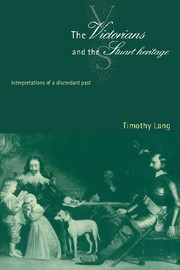Book contents
- Frontmatter
- Contents
- Preface
- Acknowledgments
- Introduction
- 1 Henry Hallam and early nineteenth-century Whiggism
- 2 Thomas Babington Macaulay and Victorian religious controversy
- 3 Puritanism and the ideology of Dissent
- 4 Samuel Rawson Gardiner and the search for national consensus
- 5 Cromwell and the late Victorians
- Epilogue
- Index
3 - Puritanism and the ideology of Dissent
Published online by Cambridge University Press: 06 October 2009
- Frontmatter
- Contents
- Preface
- Acknowledgments
- Introduction
- 1 Henry Hallam and early nineteenth-century Whiggism
- 2 Thomas Babington Macaulay and Victorian religious controversy
- 3 Puritanism and the ideology of Dissent
- 4 Samuel Rawson Gardiner and the search for national consensus
- 5 Cromwell and the late Victorians
- Epilogue
- Index
Summary
The rise of Protestant Dissent as a political force and effective challenge to the supremacy of the Anglican Establishment was one of the most important developments of the Victorian age. The repeal of the Test and Corporation Acts in 1828 and the Reform Act of 1832, by removing the formal barriers against the participation of Dissenters in national politics and by transferring Parliamentary representation to areas where Nonconformity was strong, gave Dissenters a larger role in shaping English affairs than they had enjoyed before, except perhaps during the mid-seventeenth century under the Commonwealth. The Municipal Corporation Act of 1835 increased further the influence of Dissent by breaking down the Anglican exclusiveness of local government. By 1833, Nonconformists had formulated the principal demands that would inform their politics for the next fifty years. Seeking parity with the Establishment, they insisted on exemption from Church rates, the right to conduct marriages and burials according to their own ceremonies, the civil registration of births, marriages and deaths, the removal of religious tests at Oxford and Cambridge, and the granting of a charter to the nondenominational London University. Throughout the nineteenth century, Dissenters found supporters for their cause among Whigs and Liberals, although the alliance was never an easy one. During the 1830s, Melbourne's governments attempted to meet the Dissenters' demands while at the same time maintaining the ascendancy of the Anglican Church.
- Type
- Chapter
- Information
- The Victorians and the Stuart HeritageInterpretations of a Discordant Past, pp. 93 - 138Publisher: Cambridge University PressPrint publication year: 1995



